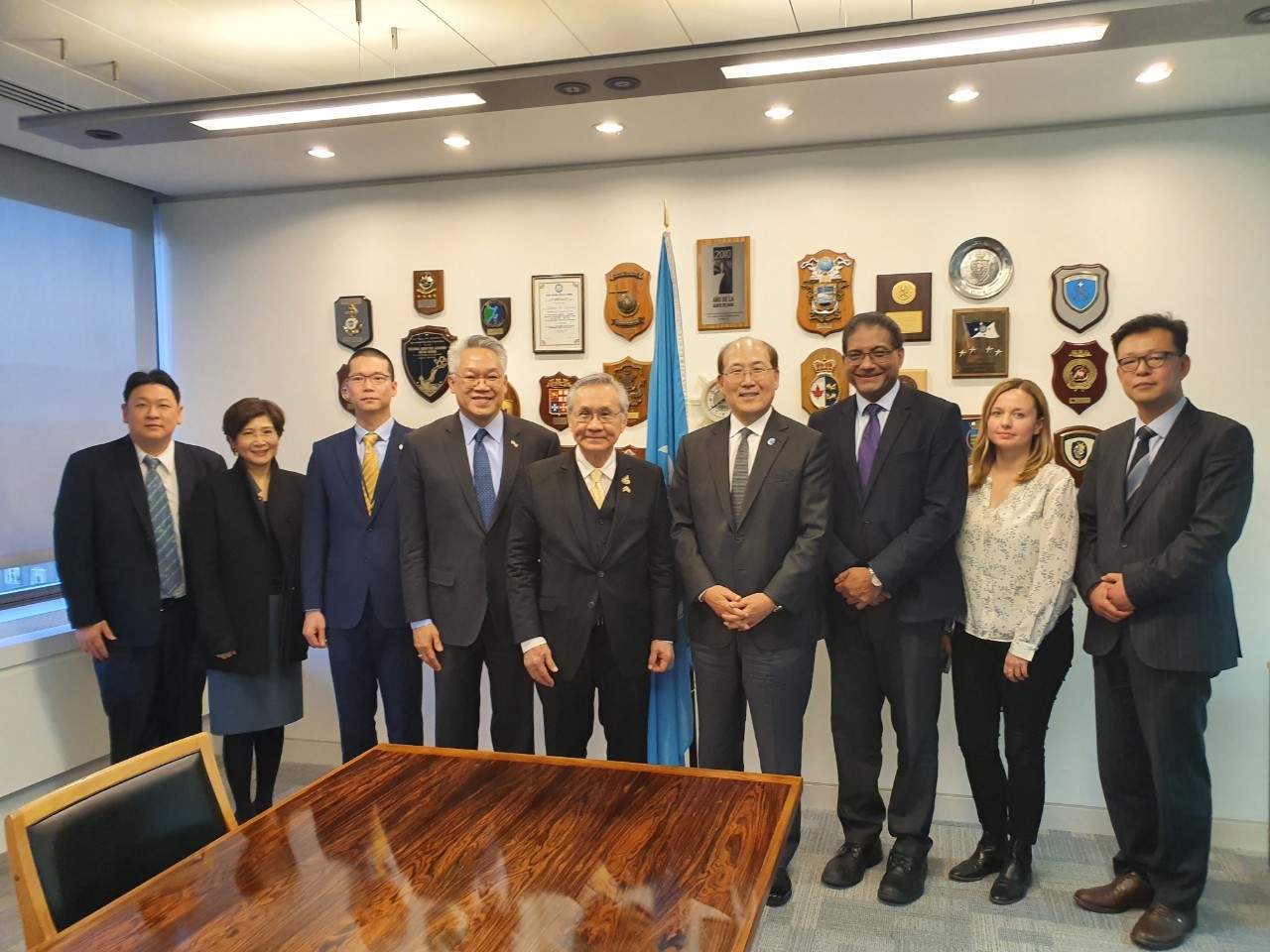Information IMO
International Maritime Organization (IMO), a specialized agency of the United Nations, was established on 1948. IMO is the global standard-setting authority for the safety, security and environmental performance of international shipping. The organization’s main role is to create a regulatory framework for the shipping industry that is fair and effective, universally adopted and universally implemented.
IMO currently has 175 Member States and 3 Associate Members (Faroes, Hong Kong and Macao). The headquarters of the IMO are located on Albert Embankment, Lambeth, London, United Kingdom.
The Organization consists of
an Assembly, a Council and 5 main Committees;
1. Maritime Safety Committee (MSC)
2. Marine Environment Protection Committee (MEPC)
3. Legal Committee (LEG)
4. Technical Cooperation Committee (TCC)
5. Facilitation Committee (FAL) and a number of Sub-Committees support the work of the main technical committees.
IMO Council Members are consisting of
Category A
10 states with the largest interest in providing international shipping services
Category B
10 states with the largest interest in international seaborne trade
Category C
20 states not elected under (a) and (b) above, which have special interests in maritime transport or navigation, and whose election to the Council will ensure the representation of all major geographic areas of the world
คณะกรรมการต่าง ๆ
1. คณะกรรมการความปลอดภัยทางทะเล
(Maritime Safety Committee: MSC)
ประกอบด้วยผู้แทนประเทศสมาชิก IMO ทั้งหมด ทำหน้าที่พิจารณาและรับรองมาตรฐานข้อบังคับเกี่ยวกับความปลอดภัยและการรักษาความปลอดภัยในการเดินเรือระหว่างประเทศ โดยเฉพาะอย่างยิ่ง ข้อบังคับภายใต้อนุสัญญาระหว่างประเทศว่าด้วยความปลอดภัยแห่งชีวิตในทะเล (International Convention for the Safety of Life at Sea: SOLAS)
2. คณะกรรมการคุ้มครองสิ่งแวดล้อมทางทะเล
(Marine Environment Protection Committee: MEPC)
ประกอบด้วยผู้แทนประเทศสมาชิก IMO ทั้งหมด ทำหน้าที่พิจารณาและรับรองมาตรฐานข้อบังคับเกี่ยวกับการคุ้มครองสิ่งแวดล้อมทางทะเลจากการเดินเรือ โดยเฉพาะอย่างยิ่ง ข้อบังคับต่าง ๆ ภายใต้อนุสัญญาระหว่างประเทศว่าด้วยการป้องกับมลพิษทางทะเล (The Convention for Prevention of Marine Pollution: MARPOL)
3. คณะกรรมการกฎหมาย
(Legal Committee: LEG)
ประกอบด้วยผู้แทนประเทศสมาชิก IMO ทั้งหมด ทำหน้าที่พิจารณาประเด็นต่าง ๆ ด้านกฎหมายที่อยู่ในขอบเขตอำนาจของ IMO
4. คณะกรรมการอำนวยความสะดวก
(Facilitation Committee: FAL)
ประกอบด้วยผู้แทนประเทศสมาชิกทั้งหมดทำหน้าที่พิจารณาและรับรองมาตรฐานข้อบังคับเกี่ยวกับการอำนวยความสะดวก ในการเดินเรือระหว่างประเทศซึ่งอยู่ภายใต้อนุสัญญาระหว่างประเทศว่าด้วยการอำนวยความสะดวก (The Convention on Facilitation of International Maritime Traffic: FAL)
5. คณะกรรมการความร่วมมือทางวิชาการ
(Technical Cooperation Committee: TCC)
ประกอบด้วยผู้แทนประเทศสมาชิกทั้งหมด ทำหน้าที่พิจารณาประเด็นเกี่ยวกับโครงการความช่วยเหลือทางวิชาการเพื่อเสริมสร้างขีดความสามารถของประเทศสมาชิกในการปฏิบัติตามมาตรฐานและข้อบังคับภายใต้อนุสัญญาฉบับต่าง ๆ ของ IMO
นอกจากนี้ ยังมีคณะอนุกรรมการต่าง ๆ ทำหน้าที่สนับสนุนงานของคณะกรรมการฯ ได้แก่
(1) คณะอนุกรรมการว่าด้วยการขนส่งสินค้าและคอนเทนเนอร์ (The Sub-Committee on Carriage of Cargoes and Containers: CCC)
(2) คณะอนุกรรมการว่าด้วยปัจจัยเกี่ยวกับมนุษย์ การฝึกอบรมและการเข้ายามของคนประจำเรือ (The Sub-Committee on Human Element, Training and Watchkeeping: HTW)
(3) คณะอนุกรรมการว่าด้วยการดำเนินงานตามตราสารต่าง ๆ (The Sub-Committee on Implementation of IMO Instruments: III)
(4) คณะอนุกรรมการว่าด้วยการเดินเรือ การติดต่อสื่อสาร การค้นหาและช่วยเหลือชีวิต (The Sub-Committee on Navigation, Communications and Search and Rescue: NCSR)
(5) คณะอนุกรรมการว่าด้วยการป้องกันและการจัดการมลภาวะ (The Sub-Committee on Pollution Prevention and Response: PPR)
(6) คณะอนุกรรมการว่าด้วยการออกแบบและต่อสร้างเรือ (The Sub-Committee on Ship Design and construction: SDC)
(7) คณะอนุกรรมการว่าด้วยระบบและอุปกรณ์ประจำเรือ (The Sub-Committee on Ship Systems and Equipment: SSE)
สำนักเลขาธิการ IMO
สำนักเลขาธิการ IMO ประกอบด้วยกองต่าง ๆ อาทิ กองความปลอดภัย กองสิ่งแวดล้อม กองกฎหมายและความสัมพันธ์ภายนอก กองการบริหารงาน กองการประชุม และกองความร่วมมือทางวิชาการ และกลุ่มงานต่าง ๆ มีเจ้าหน้าที่ประจำกว่า 300 คน โดยเลขาธิการ IMO ทำหน้าที่หัวหน้าผู้บริหารงาน (ปัจจุบัน Mr. Kitack Lim จากสาธารณรัฐเกาหลี ดำรงตำแหน่งเลขาธิการ IMO วาระแรก 4 ปี ระหว่างวันที่ 1 มกราคม 2559 – 31 ธันวาคม 2562 และวาระที่สองเริ่มตั้งแต่วันที่ 1 มกราคม 2563 – 31 ธันวาคม 2566)

